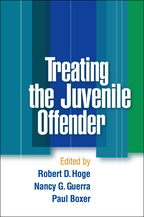Treating the Juvenile Offender
Edited by Robert D. Hoge, Nancy G. Guerra, and Paul Boxer
Hardcover
Hardcover
orderJanuary 8, 2008
ISBN 9781593856397
Price: $51.00 294 Pages
Size: 6" x 9"
“Public fear of juvenile crime has led to an increasing use of harsher sanctions, including punishing youth in the adult criminal justice system. This remarkable book provides a well-reasoned, empirically supported framework for refocusing practice and policy. The editors and contributors articulate specific prevention and treatment approaches and cogently demonstrate that a less punitive, more rehabilitation-oriented approach would be far more effective in reducing youth crime.”

—Ronald Roesch, PhD, Department of Psychology and Director, Mental Health, Law, and Policy Institute, Simon Fraser University, British Columbia, Canada
“Hoge et al. have provided a thorough yet concise review of the epidemiology and causes of juvenile offending, as well as effective interventions. Importantly, the book is extremely readable and current in its synthesis of theory and research, which enhances its utility as a graduate text. An excellent volume.”

—Scott W. Henggeler, PhD, Department of Psychiatry and Behavioral Sciences (retired), Medical University of South Carolina
“Built on a solid foundation of developmental research, this extraordinary book provides a platform for the next generation of evidence-based practice and policy in juvenile justice. The editors have set aside ideological polemics to focus on a central question: How can we best reduce recidivism in young offenders? Without question, this is the deepest, most thoroughly researched, and most up-to-date resource of its kind. It is an invaluable work that should be a 'go-to' book for anyone interested in shaping and improving the future of our juvenile justice system.”

—Randy Borum, PsyD, Department of Mental Health Law and Policy, Louis de la Parte Florida Mental Health Institute, University of South Florida
“This volume is a primer for both neophytes and experts on current theory, research, and practice in juvenile justice. The editors have crafted a cohesive set of chapters that move from recent trends in juvenile crime to developmental theories, from treatment principles to policies and best practices in particular circumstances.”

—Kenneth A. Dodge, PhD, Pritzker Professor of Public Policy and Professor of Psychology and Neuroscience, Duke University
—Ronald Roesch, PhD, Department of Psychology and Director, Mental Health, Law, and Policy Institute, Simon Fraser University, British Columbia, Canada
“Hoge et al. have provided a thorough yet concise review of the epidemiology and causes of juvenile offending, as well as effective interventions. Importantly, the book is extremely readable and current in its synthesis of theory and research, which enhances its utility as a graduate text. An excellent volume.”
—Scott W. Henggeler, PhD, Department of Psychiatry and Behavioral Sciences (retired), Medical University of South Carolina
“Built on a solid foundation of developmental research, this extraordinary book provides a platform for the next generation of evidence-based practice and policy in juvenile justice. The editors have set aside ideological polemics to focus on a central question: How can we best reduce recidivism in young offenders? Without question, this is the deepest, most thoroughly researched, and most up-to-date resource of its kind. It is an invaluable work that should be a 'go-to' book for anyone interested in shaping and improving the future of our juvenile justice system.”
—Randy Borum, PsyD, Department of Mental Health Law and Policy, Louis de la Parte Florida Mental Health Institute, University of South Florida
“This volume is a primer for both neophytes and experts on current theory, research, and practice in juvenile justice. The editors have crafted a cohesive set of chapters that move from recent trends in juvenile crime to developmental theories, from treatment principles to policies and best practices in particular circumstances.”
—Kenneth A. Dodge, PhD, Pritzker Professor of Public Policy and Professor of Psychology and Neuroscience, Duke University



